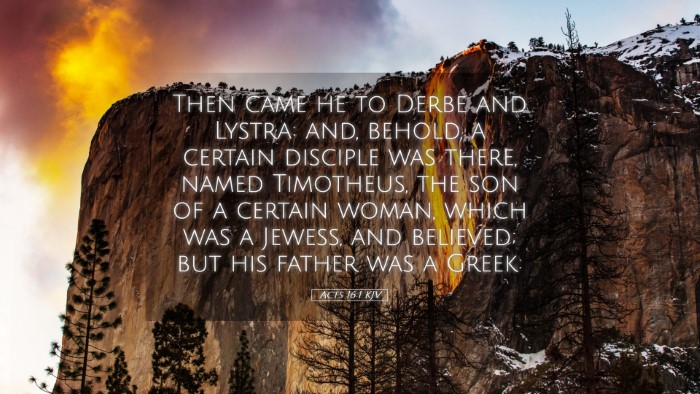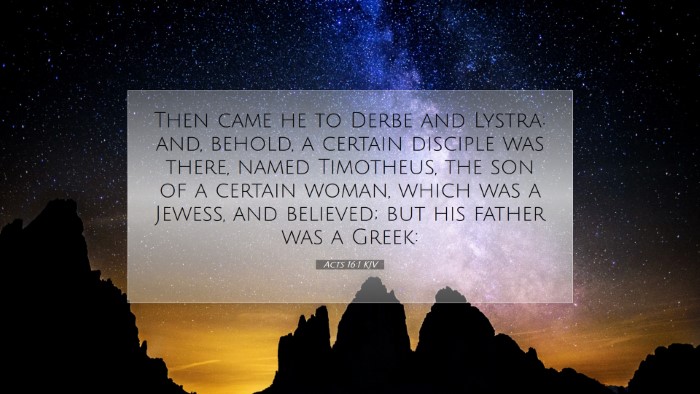Commentary on Acts 16:1
Verse: "Then came he to Derbe and Lystra: and, behold, a certain disciple was there, named Timotheus, the son of a certain woman, which was a Jewess, and believed; but his father was a Greek."
Introduction
This verse marks an important turn in the missionary journeys of the Apostle Paul, highlighting the beginning of Timothy's association with him. Understanding the cultural and religious context of Timothy's background is crucial for appreciating his role in the early Church.
Historical Context
Acts 16 falls within the broader narrative of the early church's expansion. Paul, having completed his first missionary journey, revisits some of the areas where he had preached to strengthen the believers. Derbe and Lystra were significant locations in the province of Galatia, known for their paganism, yet they also housed early followers of Christ.
Insights from Commentaries
Matthew Henry's Perspective
Matthew Henry emphasizes the providence of God in guiding Paul to these cities. He notes that Timothy, whose name means “honoring God,” is described as a “disciple” which indicates his commitment to the teachings of Christ. Henry remarks on Timothy's mixed heritage, being the son of a Jewish mother and a Greek father, as significant, suggesting that this uniqueness equipped him to reach diverse audiences.
Albert Barnes' Analysis
Albert Barnes sheds light on Timothy's background, highlighting the influence of his mother, Eunice, whose faith is mentioned in 2 Timothy 1:5. Barnes points out that Timothy's Greek father suggests a contrast between Jewish religious life and the broader Hellenistic culture. Timothy's acceptance and belief, alongside his mixed heritage, signify the breaking down of cultural barriers within the church. This inclusion resonates with the Acts narrative where the gospel transcends ethnic divisions.
Adam Clarke's Observations
Adam Clarke elaborates on the implications of Timothy’s upbringing, noting that while he was raised by a Jewish mother, his Greek father’s influence likely exposed him to broader philosophical ideas. Clarke comments on the significance of the Jewish mother's faith in Timothy's development as a disciple. He suggests that she understood the prophecies concerning the Messiah, which may have shaped Timothy's understanding of his faith.
Theological Implications
- The Role of Family in Faith: The text emphasizes the importance of parental influence in spiritual formation. Timothy's mother exemplifies how a nurturing and faith-filled environment can lead to the development of a strong disciple.
- Inclusivity of the Gospel: Timothy's dual heritage serves as a powerful symbol of the gospel's reach beyond traditional boundaries, affirming the idea that faith in Christ is accessible to all, regardless of background.
- Preparation for Ministry: Timothy’s selection by Paul signifies that God prepares individuals for service, regardless of their familial or cultural context. God's calling often comes through unique and diverse paths.
Application for Today
The lessons gleaned from Acts 16:1 are applicable to current church practices and the global mission. Pastors and church leaders can draw from Timothy's example, encouraging the development of leaders from various backgrounds. In an increasingly multicultural world, fostering an environment where diverse gifts and backgrounds are celebrated can enhance church vitality and mission effectiveness.
Conclusion
Acts 16:1 serves as a reminder of God’s sovereignty in calling individuals for His purpose, regardless of their background. Timothy's story challenges believers to consider how their personal narratives and family influences shape their faith journey. As they engage in ministry, understanding the diverse backgrounds of fellow believers and potential converts can lead to more effective and meaningful outreach.


